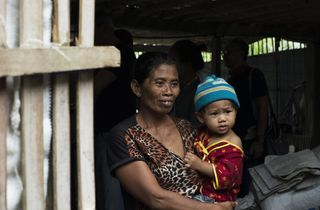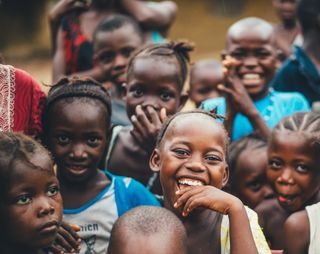Gender
The Psychological Needs of Resettled Refugee Women
Nobel Peace Prize recipients highlight consequences of conflict and violence.
Posted October 10, 2018
This year’s Nobel Peace Prize was awarded to Nadia Murad and Dr. Denis Mukwege. This award brings much needed attention to the human rights abuses encountered by women in war-torn countries. Murad is an Iraqi Yazidi who was tortured and raped by Islamic State militants. She subsequently led a campaign highlighting the plight of the Yazidi people. Mukwege is a gynecologist in the Democratic Republic of Congo and founder of the Mukwege Foundation. Along with his colleagues, he has attended to the needs of women in warzones, has treated thousands of victims of sexual violence, and is working tirelessly to end sexual violence as a weapon of war.
Our research team at QUT has been focusing on the mental health needs of women who have entered Australia through a specific visa category, termed the women-at-risk program (Visa subclass 204). The program was established to respond to the need to resettle women who meet the United Nations High Commissioner for Refugees criteria for women at risk—“those women or girls who have protection problems particular to their gender, and lack effective protection normally provided by male family members.”
Women-at-risk comprise approximately 10 percent of UNHCR submissions for resettlement in countries like Australia, Canada, and the United States. The experiences of refugee women-at-risk often involve gender-related violence, such as rape or sexual bartering. Gender-based assaults take place in addition to physical and social challenges, including pregnancies and community ostracism. These difficulties occur against a background of related difficulties such as the needs of children and parenting skills described in a post by Kenneth Miller.
As part of our research program at the Queensland University of Technology, in collaboration with the University of New South Wales, we have been meeting with women who have entered Australia as refugees under the Australian Government’s Humanitarian settlement program, and who meet the criteria for women at risk. The resettlement context is, of course, different from the contexts described by the Nobel laureates. We have interviewed and assessed women who have resettled in South East Queensland, Australia, on a range of mental health measures, with the goal of assessing mental well-being over time.
Some women are single, many have lost their male spouses in conflict zones, and some are parents. In one instance, I interviewed a woman who arrived in Australia with three of her children but needed to leave her fourth child in Kenya because she completed her application before realizing that she was pregnant. She gave birth to the child after her paperwork was approved and then faced the agonizing decision of staying in her dangerous homeland or fleeing to safety without her baby.

Another research project focused on the experience of resettlement and well-being following resettlement. We interviewed 104 women-at-risk, all over 18 years old, and all of whom had entered Australia within the previous six months. Almost 80 percent were from Africa, including women from Eritrea, Democratic Republic of Congo, Ethiopia, South Sudan, Rwanda, and Burundi. The balance comprised women from Afghanistan, Iran, Iraq, Syria, Myanmar and Thailand.
A significant proportion of the women interviewed reported psychiatric distress within symptomatic ranges, which were higher than we have found in women from refugee backgrounds in other studies which did not focus on women-at-risk. While I would caution against medicalizing distress, it is noteworthy that over 40 percent of the women reported clinically significant trauma symptoms, 20 percent reported symptoms consistent with post-traumatic stress disorder, almost 30 percent reported high levels of anxiety symptoms, and over 40 percent reported symptoms consistent with depression. In addition, over 40 percent reported bodily complaints, such as persistent headaches. These findings point to the need to develop designated services for those women who are most vulnerable.
Both the number of trauma events prior to their migration to Australia, and the number of difficulties experienced since arriving in Australia predicted trauma, anxiety, and somatic symptoms. In addition, having children at the time of migration appeared to predict higher levels of distress. There is a general assumption that the experience prior to resettlement results in distress, yet in a previous study published in 2006, we found that post migration difficulties were more significant than pre-migration difficulties in predicting distress in people from Sudan seeking refuge in Australia.

What’s Next
Recognizing the work of Nadia Murad and Dr. Denis Mukwege raises issues for psychologists in high income countries concerning our role, and our potential to address causes as well as the impacts of gender-based violence and terror and its impact on all people. There is clearly a need to utilize our expertise to address gender disparity and all forms of adversity, including violence, racism, and poverty, whether this occurs within the context of refugee camps or countries of resettlement. Ideally, it would be preferable to focus attention on the conditions which give rise to conflict, rather than dealing with the aftermath of conflict. There are few psychologists working at this level, and the impacts appear to be limited.
The findings also point to service gaps for women who have moved out of conflict zones. Priorities include the need for safety, financial support, improved pre-arrival information to prepare women coming to a high income country such as Australia, specialist women’s health services, and secure accommodation upon their arrival. No doubt, there are similar service gaps in other high income countries, and even greater disparity affecting the vast majority of forcibly displaced women who have no option and are not offered opportunities for resettlement in third countries.
There is a need to move beyond assessment of mental health needs, and to engage with people to address the difficulties which are now well documented. There are a number of innovative programs being trialed in which psychologists and mental health workers are working with local non-government organizations, to build skills and foster cohesion in emerging communities comprising people from refugee backgrounds. In Australia, the government provides resources to address settlement needs, with an emphasis upon English language development and promoting skills for employment.
In our experience in working with people from refugee backgrounds, we recognize a need to move past a focus on previous experiences and trauma, to a more community-based orientation. Such an approach would acknowledge the work of Nadia Murad and Denis Mukwege, both of whom have drawn upon their cultural understanding of the misuse of power, and threats to personal and group integrity. Through their work, they have formed organizations addressing the needs of people who have been subject to unimaginable adversity and provide inspiration for others to follow suit.




